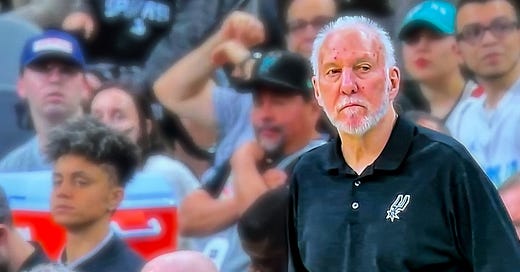Spurs can't keep losing battle within the battle
With only 13 games remaining before a critical offseason begins, time is running out for San Antonio to meet self-imposed goals.
Gregg Popovich has been a reasonable interviewee this season — not quite as patient as he was during last year’s pursuit of the top pick in the draft, and not nearly as combative as he’s been during runs at a title, but somewhere in the middle. He has range, though.
When combing through soundbites dating back to training camp and running all the way up to Tuesday night’s 113-107 loss to the Mavs, a discerning ear can identify in Popovich’s telling tone this is a team he expected would perform better than it has. He’s never wavered in his support of the young Spurs, nor has he failed to give credit where it’s due. But it’s clear there’s at least one recurring glitch in the system that consistently brings out his angry side.
Pop took control of the conversation about 30 seconds into his post-game presser, interrupting a question about the solid defense his team played against Luka Dončić and pivoting to a source of frustration instead.
“You guys got stat sheets over there? We outrebounded them, we shot better than they did, we outscored 'em in the third quarter, outscored 'em in the fourth quarter, we had the same number of assists, basically … but we had 16 turnovers. That's the difference in the game,” he shot back before regrouping. “I couldn't be more proud of the way we played. We have made all kinds of mistakes, but so did they and they want to win a championship. Our goal is to get better every game individually and team-wise, and they did that. I'm really proud of what they did. So that's the bottom line. Nothing else to it. They busted their ass and played to win. Can't ask for anything else.”
All season, Popovich has straddled the thin line that exists for any coach in his situation, trying not to morph from teacher into disciplinarian too stridently when expectations aren’t met. But even at 75 years old, competitiveness is still very much a part of his being — something that’s simple to deduce in the immediate aftermath of most losses, but especially after losses where wins were within reach. He understands mistakes will be made and shots will be missed, but it’s the repeated self-inflicted wounds to the foot that have marred otherwise competitive performances.
Keep reading with a 7-day free trial
Subscribe to Corporate Knowledge to keep reading this post and get 7 days of free access to the full post archives.




